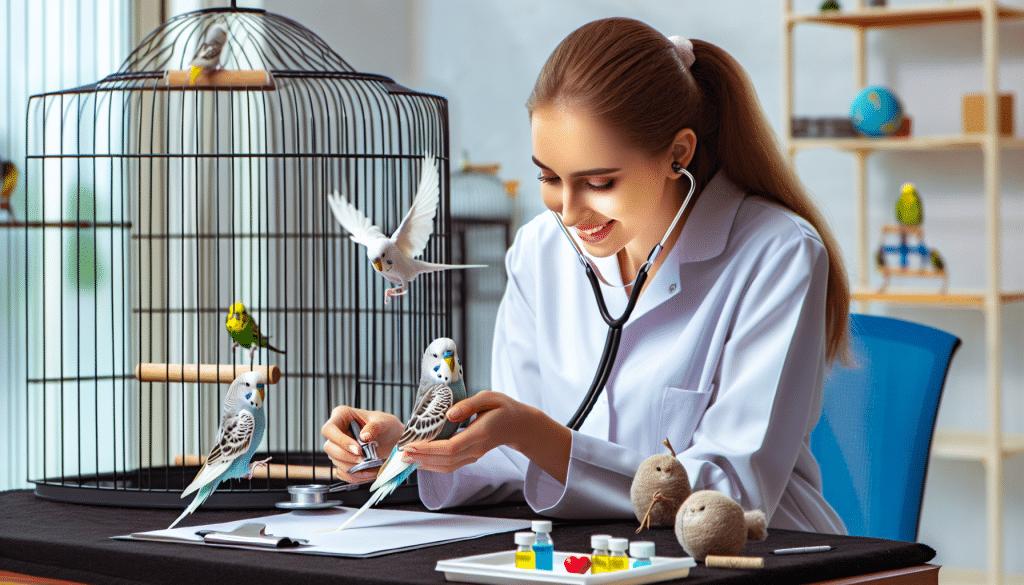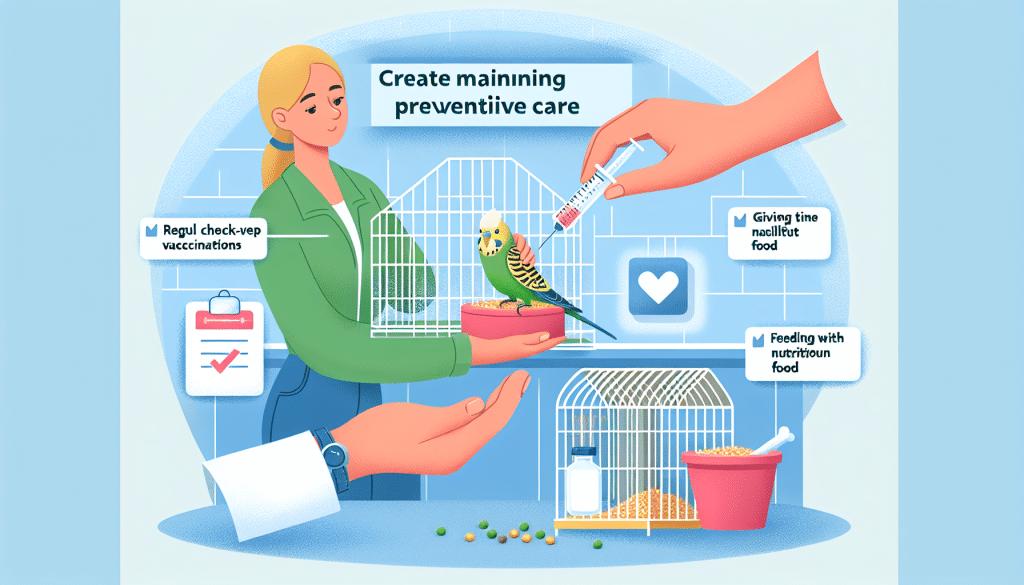Imagine a world where your little budgie companion is always healthy, vibrant, and full of life. A world where the visits to the vet are only for routine check-ups and not for emergencies. In this article, we will explore the essentiality of preventive care for budgies, as it not only ensures their well-being but also saves you from unnecessary worry and expenses. From regular health examinations to a balanced diet and proper hygiene, discover how preventive care can be a game-changer in providing your feathered friend with a long and happy life.

Understanding Preventive Care for Budgies
Definition of Preventive Care
Preventive care refers to proactive measures taken to maintain the health and well-being of budgies, also known as parakeets. It involves regular monitoring, appropriate nutrition, cleanliness, exercise, and routine check-ups to prevent potential health issues and ensure a long and happy life for our feathered friends.
Why Preventive Care is Crucial for Birds
Preventive care plays an essential role in keeping budgies healthy and vibrant. By implementing preventive measures, we can identify and address potential health concerns before they become serious problems. Regular check-ups and health monitoring allow for early detection and early intervention, increasing the chances of successful treatment and improving overall budgie health and longevity.
Misconceptions about Bird Health and Longevity
There are several misconceptions surrounding bird health and longevity that can hinder our understanding of preventive care. One common misconception is that birds are hardy creatures that require minimal care. In reality, budgies, like any other living beings, require proper nutrition, exercise, mental stimulation, and regular veterinary check-ups to ensure their well-being. It is crucial to dispel these misconceptions and prioritize preventive care to provide the best life possible for our feathered companions.
Nutrition and Diet
Essential Nutrients for Budgies
A well-balanced diet is crucial for the health of budgies. Essential nutrients for budgies include high-quality pellets, fresh fruits, vegetables, and a variety of seeds. Pellets provide a solid foundation of essential vitamins and minerals, while fruits and vegetables offer additional nutrients and natural antioxidants. Seeds can be given as treats but should not be the primary component of a budgie’s diet. Providing a diverse range of nutrients ensures optimal health and reduces the risk of deficiencies or imbalances.
Recommended Foods and Treats
To promote preventive care, it is important to offer a diverse range of nutritious foods and treats to budgies. Dark leafy greens like spinach and kale provide vitamins A and C, while fruits such as apples and berries offer natural antioxidants. Other recommended foods include carrots, bell peppers, and cooked sweet potatoes. Treats like millet sprays or cuttlebones should be given in moderation, as excessive consumption can lead to weight gain and nutritional imbalances.
Foods to Avoid for Budgie Health
While it is important to provide a varied diet, there are certain foods that should be avoided to ensure the well-being of budgies. Foods high in sugar, such as chocolate or sugary cereals, can lead to obesity and other health issues. Avocado, rhubarb, and onion are toxic to budgies and should never be fed to them. Additionally, it is advisable to avoid feeding budgies with caffeine, alcohol, or any artificially flavored or colored foods, as these can be harmful to their health.

Cleanliness and Hygiene
Regular Cage Cleaning Procedures
Maintaining a clean and hygienic environment is essential for budgie health. Regular cage cleaning should include daily removal of droppings, food debris, and soiled bedding. A thorough cleaning should be conducted weekly, involving the removal of all items from the cage, washing them with a bird-safe detergent, and disinfecting the cage itself. A clean cage helps prevent the growth of harmful bacteria and ensures a healthy living space for budgies.
Safe and Unsafe Cleaning Substances
When cleaning the budgie’s cage or accessories, it is crucial to use safe and non-toxic substances. Avoid using bleach, ammonia, or any harsh chemicals, as they can be harmful to your budgie’s respiratory system. Instead, opt for mild, bird-safe detergents or homemade cleaning solutions using vinegar or hydrogen peroxide. Always thoroughly rinse any cleaning products to prevent budgies from inhaling or ingesting potentially harmful residues.
Importance of Personal Hygiene for Handlers
Maintaining good personal hygiene is equally important when caring for budgies. Wash your hands thoroughly before and after handling your budgie or cleaning their cage to prevent the transmission of harmful bacteria or other contaminants. Avoid smoking or using any scented products near budgies, as their respiratory systems are sensitive to irritants. By practicing good personal hygiene, you can reduce the risk of illnesses and ensure a healthy and safe environment for both you and your budgie.
Exercise and Enrichment
Creating a Stimulating Environment
Creating a stimulating and enriching environment is vital for the overall well-being of budgies. Provide them with a spacious cage that allows for ample movement and flight. Include various perches and toys of different textures, shapes, and colors to encourage exploration and mental engagement. Rotate toys regularly to prevent boredom and stimulate their natural curiosity.
Types of Exercises for Budgies
Budgies are active birds and require regular exercise to stay healthy. Encourage exercise by allowing them to fly freely outside the cage in a safe and supervised environment. Install bird-safe mirrors or interactive toys that can stimulate their natural behaviors, such as climbing or swinging. Additionally, regular out-of-cage time allows budgies to spread their wings and engage in essential physical activity.
Mental Stimulation and Stress Reduction
In addition to physical exercise, mental stimulation is vital for budgie health. Engage them in interactive activities such as teaching tricks, playing games, or providing foraging opportunities. These activities encourage problem-solving and prevent boredom. Additionally, creating a peaceful and stress-free environment by minimizing loud noises or sudden changes can help reduce stress, which is essential for proper budgie health and well-being.

Regular Health Check-ups
Schedule and Frequency of Veterinary Visits
Regular veterinary check-ups are crucial for preventive care. It is recommended to schedule a visit with an avian veterinarian at least once a year for a comprehensive examination and preventive care assessment. For older budgies or those with existing health conditions, more frequent visits may be necessary. Establishing a routine schedule of veterinary visits ensures early detection of potential health issues and maintains the well-being of your budgie.
What to Expect During a Check-up
During a budgie’s check-up, the avian veterinarian will conduct a thorough examination to assess their overall health. This includes checking their weight, respiratory function, plumage condition, and examining their eyes, beak, and feet. The veterinarian may also perform blood tests or other diagnostic procedures if necessary. They will discuss any concerns or observations and provide guidance on nutrition, environmental conditions, and preventive care measures specific to your budgie’s needs.
Common Diseases and How to Detect Them Early
Several common diseases can affect budgies, and early detection is crucial for timely treatment. Look out for signs of respiratory distress, such as sneezing, wheezing, or discharge from the nostrils. Weight loss, changes in appetite or behavior, feather abnormalities, or lumps are also potential indicators of health issues. Regular observation and familiarity with your budgie’s typical behavior and appearance will aid in detecting any abnormalities promptly and seeking veterinary care when needed.
Understanding Budgie Behavior
Normal vs. Abnormal Behaviors
Understanding budgie behavior is vital in providing appropriate care and identifying any potential health concerns. Normal behaviors include singing, chirping, grooming, and active engagement with their surroundings. Abnormal behaviors may include excessive feather plucking, aggression, or changes in vocalization. If you observe any unusual behavior, it is important to investigate and consult with an avian veterinarian to rule out any underlying health conditions.
Signs of Distress or Illness
Budgies often exhibit subtle signs when they are in distress or experiencing illness. These signs may include decreased activity, excessive sleeping, fluffed feathers, loss of appetite, or changes in droppings. Be vigilant in observing any changes in behavior or physical appearance, as early detection can help prevent the progression of potential health issues. If you notice any concerning signs, consult with a qualified avian veterinarian promptly.
Social Interaction and Its Health Impacts
Budgies are highly social birds and thrive on social interaction with their human caretakers and fellow birds. Regular interaction, talking, and gentle handling can provide mental stimulation and improve their overall well-being. Isolation or lack of socialization can lead to stress and potential health problems. Ensuring that your budgie has ample opportunities for social engagement is crucial for maintaining their mental and emotional health.
Environmental Factors and Safety
Ideal Cage Placement and Room Conditions
Proper cage placement and optimal room conditions are essential for the health and safety of budgies. Place the cage away from drafts, direct sunlight, or sources of extreme heat or cold. Avoid exposing them to cigarette smoke, fumes from cooking appliances, or any potentially toxic substances. Maintaining moderate room humidity and temperature levels, as well as providing adequate ventilation, is vital for budgie respiratory health.
Hazards to Look Out for in the Home
Creating a safe environment is crucial to prevent accidents or potential hazards for budgies. Avoid exposing them to toxic plants, open windows or doors, electrical cords, or any small objects that could be swallowed. Keep them away from the kitchen where they might be exposed to dangerous cooking appliances or chemicals. Regularly inspect the living environment for any potential dangers and take necessary precautions to keep your budgie safe.
Safe Interaction with Other Pets
If you have other pets, it is important to ensure their interaction with your budgie is safe and supervised. Predatory instincts in dogs or cats can pose a threat to the budgie’s safety. Always supervise interactions between pets and provide a separate and secure area for your budgie’s cage to prevent access by other animals. With proper precautions and monitoring, it is possible for budgies to coexist safely with other pets.
Molting and Feather Care
The Molting Process and What to Expect
Molting is a natural process where budgies shed old feathers and grow new ones. It is important to understand that some degree of feather loss during molting is normal. Budgies may appear scruffy or have temporary bald patches during this period. Increased preening and feather maintenance are also typical. However, if you notice excessive feather loss, bleeding, or signs of discomfort, it is advisable to consult with an avian veterinarian to ensure there are no underlying issues.
Supplements and Nutrition During Molting
Proper nutrition and supplements play a crucial role in supporting budgies during the molting process. Offering a high-quality diet that includes a variety of fresh vegetables, fruits, and pellets provides the necessary nutrients for feather growth. Additionally, adding dietary supplements like omega-3 fatty acids or vitamin supplements specifically designed for birds can support healthy feather growth and enhance the overall health of molting budgies.
Recognizing Problems with Molting
Molting is a natural process, but sometimes issues may arise that require attention. Feather plucking, bald spots, or uneven feather regrowth can indicate underlying health problems or nutritional deficiencies. If you notice abnormal feather loss or their feathers fail to regrow properly, it is important to consult with an avian veterinarian to determine the underlying cause and take appropriate measures to address the issue.
Reproductive Health and Breeding
Recognizing Breeding Behaviors
Budgies have reproductive instincts, and it is important to recognize and understand their breeding behaviors. Male budgies may display courtship behaviors such as singing or regurgitating food to their potential mates. Female budgies may exhibit nesting behavior or engage in mating rituals. While these behaviors are normal, it is essential to avoid encouraging or facilitating breeding unless you are knowledgeable and prepared to handle the responsibilities of proper breeding practices.
Managing Budgie Breeding Responsibly
Breeding budgies requires a significant commitment of time, resources, and knowledge. Responsible budgie breeding involves ensuring the well-being of the parents, providing appropriate nutrition and care, and creating suitable nesting conditions. It is important to educate yourself about breeding practices and seek guidance from experienced breeders or avian veterinarians to ensure that breeding is done ethically and responsibly.
Preventing Unwanted Breeding and Egg Laying
Unwanted breeding and excessive egg laying can pose health risks to female budgies. To prevent unwanted breeding, avoid providing nesting materials, remove any potential nesting sites, and avoid prolonged periods of darkness, as this can trigger hormonal changes. If you notice excessive egg laying or signs of distress, consult with an avian veterinarian to evaluate the budgie’s health and discuss potential interventions to prevent complications.
Building a Relationship with Your Avian Vet
Choosing the Right Avian Veterinarian
Building a relationship with a qualified avian veterinarian is crucial for ensuring the best possible care for your budgie. Look for a veterinarian experienced in avian medicine who can provide comprehensive preventive care, answer your questions, and address any concerns you may have. Seek recommendations from fellow bird owners or avian-specific organizations to find a vet who is knowledgeable and passionate about avian health.
Communicating Effectively About Your Budgie’s Health
Effective communication with your avian veterinarian is vital in providing the best care for your budgie. Be prepared to provide detailed information about your budgie’s diet, behavior, and any observed changes or concerns. Take notes or maintain a health journal to record any changes in behavior, eating habits, or other pertinent details. By effectively communicating with your vet, you can work together to develop a preventive care plan tailored to your budgie’s specific needs.
Benefits of an Ongoing Veterinary Relationship
Establishing an ongoing relationship with your avian veterinarian offers numerous benefits for both you and your budgie. Regular veterinary visits allow for thorough check-ups, early detection of potential health issues, and proactive preventive care measures. Your vet can offer guidance on nutrition, care, and behavior, and provide recommendations specific to your budgie’s individual needs. This ongoing support and professional expertise contribute to the overall health and well-being of your budgie.
In conclusion, understanding and implementing preventive care for budgies is essential in ensuring their overall health and longevity. By providing a balanced diet, maintaining cleanliness and hygiene, promoting exercise and mental stimulation, scheduling regular veterinary check-ups, understanding budgie behavior, creating a safe environment, and addressing specific needs during molting, breeding, and beyond, we can offer our feathered friends the care they need and deserve. Building a relationship with a trusted avian veterinarian further enhances their well-being and provides us with valuable support and guidance along the way. So, embrace the importance of preventive care for budgies and embark on a journey to provide them with a vibrant and fulfilling life.
